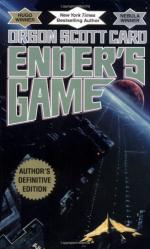|
|
Ender's Game Topic Tracking: Games
Chapter 2
Games 1: Peter decides, upon discovering that Ender has lost his monitor, that the two boys should play "buggers and astronauts," a futuristic update of "Cowboys and Indians." Peter always chooses to be the astronaut (as always), which means Ender must wear the bugger mask. Even as a six-year-old, Ender realizes that this "game" is actually a representation of some reality. He also knows that his life would be in danger from the moment he starts to play. Therefore, he resists, and Peter forces him to "play." The game quickly turns sinister, and Peter appears ready to kill Ender when Valentine intervenes. Whether it was Valentine's intervention that saved Ender, or the fact that Peter was actually "just playing," is unclear.
Chapter 5
Games 2: The game room is a central part of life at Battle School, and Ender sees the military strategy in the games. He critiques the computer's strategy and the strategy of the other students. He develops strategies of his own to defeat the game before sitting at the controls. Then, he defeats an experienced student, indicating to Ender that his ability in the game, and therefore the military, was more than adequate.
Chapter 6
Games 3: Ender plays the Fantasy Game. As the game adapts to his play, it challenges him to try to solve puzzle after puzzle until the Giant's Drink, the "impossible" puzzle. Normally, students eventually give up, the voices at the beginning of the chapter tell us, but Ender does not. He plays and plays until he decides to break the rules in order to win. The game which tormented him was vanquished.
Chapter 7
Games 4: The most obvious game is the battleroom's war games between "armies" of students is the central feature of life in an army. Everything that is done is done in a pseudo-military structure. Though the students take the game as seriously as one would real war, Petra reminds Ender that it is a game, and the teachers are the real enemy.
Chapter 8
Games 5: Ender participates in the games and proves himself to be a worthy player. He is reminded by Dink, though, that the games are only games, and that teachers are the true enemies.
Chapter 9
Games 6: It is important to note that the adults do not refer to the fantasy game as such - they call it the "mind game." It is obviously important as one component in a slew of "games" they use to analyze their students.
Chapter 10
Games 7: Ender, at the end of the chapter, makes an important decision. Though he will command his army and make the best of his teacher-imposed isolation, he will no longer play to win the game. He decides to defeat the adults in the real war. He wants to put the games away.
Chapter 11
Games 8: The teachers start destroying the normal structure of the war games, to see how well Ender can handle it. Ender does not see himself as playing against the other army, but the teachers. The other army is simply a proxy for the teacher's wishes. Ender expresses this after battling Salamander, telling Major Anderson that the adults need to cheat intelligently.
Chapter 12
Games 9: Ender was on the verge of giving up on the teachers before fighting Bonzo, but afterwards, he gives up on the games completely. He doesn't want to play their games anymore.
Chapter 14
Games 10: Ender's final training consists of, of course, games on a simulator. The adults seem to take it seriously, so Ender does as well. Eventually, he's scared that they will kill him if he fails, and Mazer reassures him that this final training scenario is just a game. Of course, it is not. For the adults, the games were the only real thing, and Ender finally understands that when he defeats the Buggers through this supposed "game."




